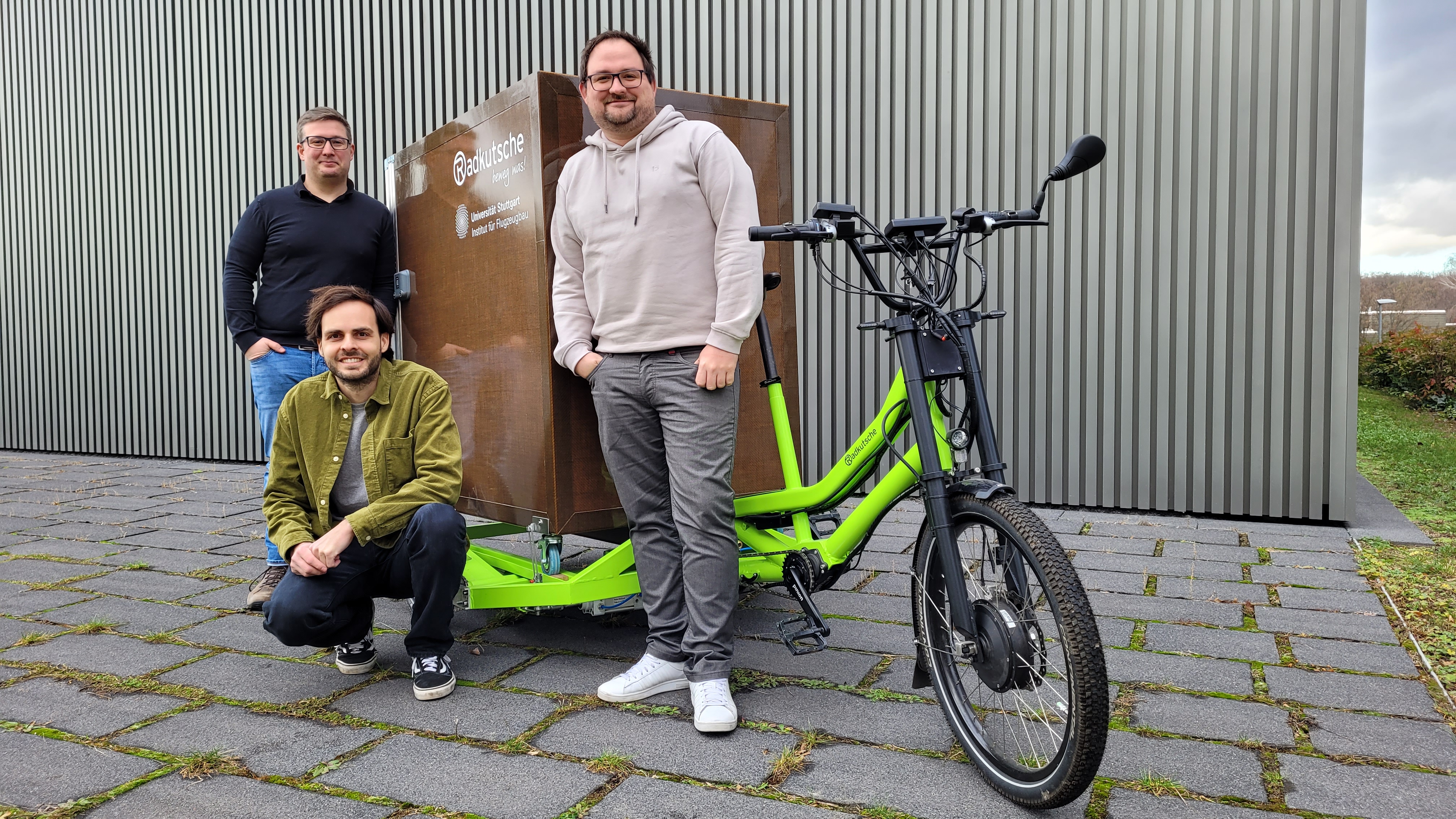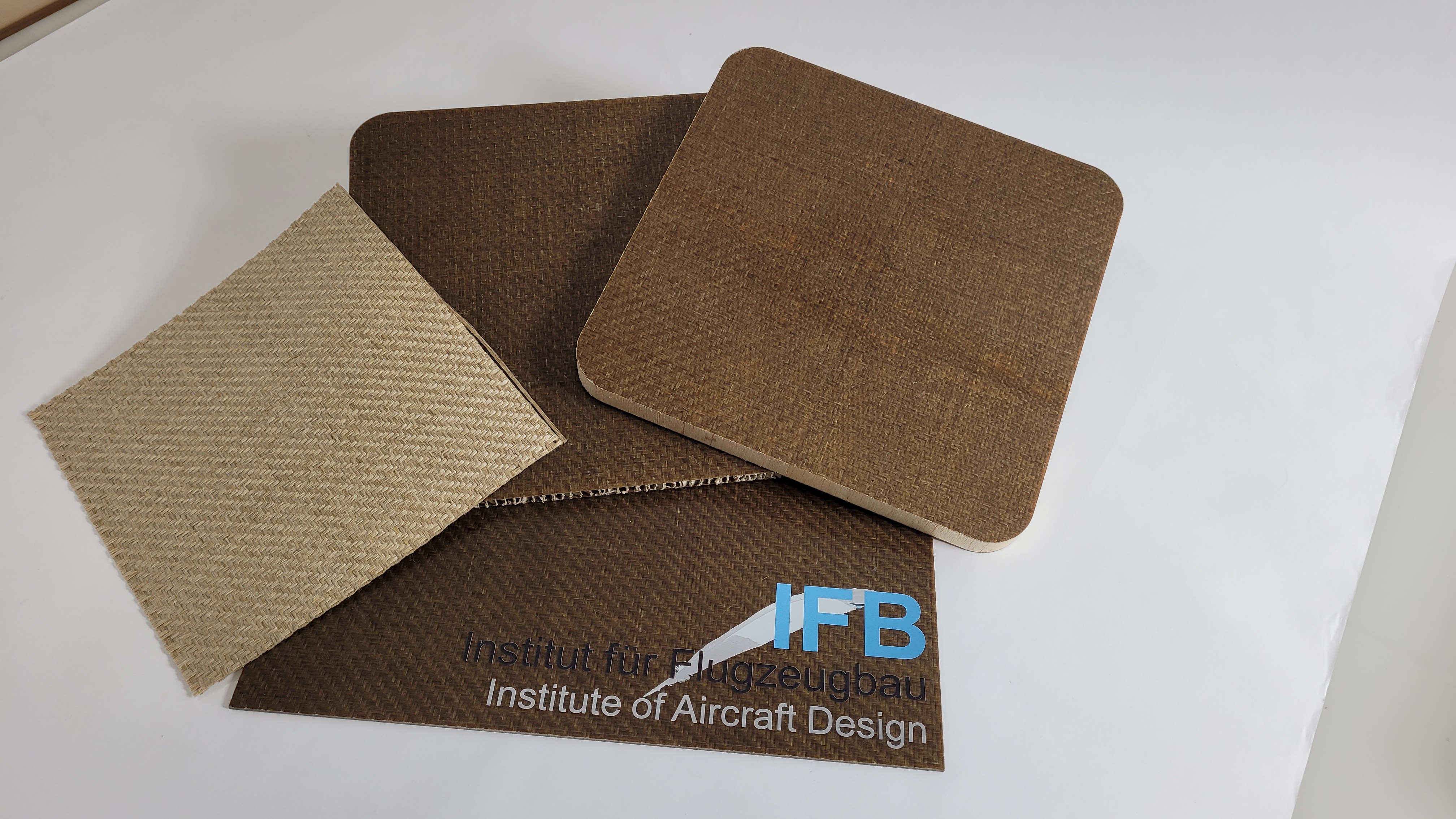In modern cars, trains and cargo bikes, lightweight components made of aluminum sheets, glass fiber or even carbon fiber composites are used. They are all manufactured with high energy consumption, are difficult or impossible to recycle and therefore worsen the environmental balance of modern low-emission mobility applications. A three-person team from the Institute of Aircraft Design (IFB) at the University of Stuttgart is tackling this sustainability problem of the mobility transition with flax fibers and bio-polymer. They have developed a new impregnation process that makes natural fiber composites a sustainable, safe and stable alternative in lightweight construction. As part of the ICM Transfer Bottom-Up project "NaturStoff", they have been refining their approach since the beginning of 2024 so that it can become a scalable industrial process. Their goal is a spin-off, for which they are also preparing as part of the ICM Early Ride program.

BEHtec: Sustainable lightweight construction from Stuttgart
Lightweight construction plays a decisive role for all types of vehicles of future mobility. A team at the IFB has developed a process that can be used to produce many lightweight components from natural fiber composites. Now the members want to get started with it and are being supported by the InnovationCampus Future Mobility (ICM). As part of a transfer bottom-up project, they can bring their processes closer to series maturity while learning the skills required for the spin-off in the Early Ride program.

"We can replace energy-intensive lightweight construction materials with a bio-based material and thus significantly reduce CO2 throughout the entire life cycle of the product," explains Klaus Heudorfer, a graduate engineer in aerospace technology. To achieve this goal, he and his two co-founders have literally removed all plastics from the natural fiber composite material except for the prescribed additives for fire protection and the effects of extreme climatic conditions, which they also want to replace with another solution soon. Flax fibers and bio-polymers are the supporting components of their material, which not only has stable mechanical properties, but is also protected against the hygroscopic properties of natural fibers. Exactly how the team managed to achieve this remains a trade secret. "Our process enables the efficient production of natural fiber-reinforced plastics NFRP with better mechanical properties than many other production processes," says Mathias Engelfried, M.Sc. in Mechanical Engineering. The result is a natural material that is already a stable and sustainable replacement for aluminum sheets and glass fiber composites. Compared to competing materials, the natural material can even be recycled in a more environmentally friendly way. However, the founders are thinking one step ahead and are working towards the longest possible service life and the use of recycling cycles.
Sustainable lightweight construction for the mobility and energy transition
The transport box that Mathias built together with cargo bike manufacturer Radkutsche as part of a research project proves just how good this natural material is. This demonstrator marks the beginning, but not the end of the versatile application possibilities. The founders have in mind, for example, interior components for buses, cockpit panels or seat shells for cars, furniture in motorhomes, tubs for cargo bikes and, in the future, even components for wind turbines. Theoretically, all areas in which lightweight construction is important come into question.

"The next challenge for us is to further develop our process so that we can meet the requirements of different industries," says Dominique Bergmann, a graduate engineer in aerospace technology. One of the ways in which this is to happen is as part of the ICM Transfer Bottom-Up project "Naturstoff". The new format was created by the ICM to support researchers in preparing a spin-off. The funding can be used for the further development of potentially marketable products, processes or services. During the course of the project, the team also develops its business model together with a mentor. "This gives us the opportunity to further develop our laboratory results from basic research for the upcoming series production," emphasizes Dominique.
Researcher's heart meets entrepreneurial spirit
With a great deal of self-irony, the three upcoming founders have already assigned their roles to each other, even though they have not yet founded a company. As an experienced team leader at IFB, Dominique takes on the role of CEO, mechanical engineer Mathias that of the free-thinking developer and CTO, while Klaus always has an eye on feasibility like a COO. "We are in the discovery phase, know where we want to go and are currently working on a business plan that will turn our research results into a business model," explains Klaus. Researchers rarely learn the necessary skills for this in their labs, but they do, for example, as part of the ICM Accelerator. This is precisely why the three have already completed the Intrapreneurship Program last summer and are now also taking part in the Early Ride Program, the second Accelerator module. They want to learn how to get started as founders as successfully as possible. Start-ups instead of large companies. By founding their own company, they associate the opportunity to further develop their product according to their ideas and to create a sustainable lightweight alternative for as many areas as possible. Entrepreneurial spirit and the idealism of science are not always mutually exclusive.
ICM Early Ride Program
The ICM Early Ride Program is an incubator program for innovation projects from the university environment in Baden-Württemberg with a strong focus on mobility and production. We help students, doctoral candidates and post-docs from research institutions to explore the potential of their research and awaken their entrepreneurial spirit.
- Information on the Early Ride Program
- Charging Time App - The solution to range anxiety
- BEHtec - Lightweight construction with natural fibers
- Litona - Sodium ion batteries
- MoThor Batteries - Replaceable battery cells
- ZeNo Battery Testing - Battery tests without battery
- Damper Dudes - Adaptive suspension strut for motorcycles
- Dyna Charge - Dynamic charging
Contact
Benjamin Büchner
Editorial and public relations, InnovationCampus Future Mobility
E-Mail: medien(at)icm-bw.de